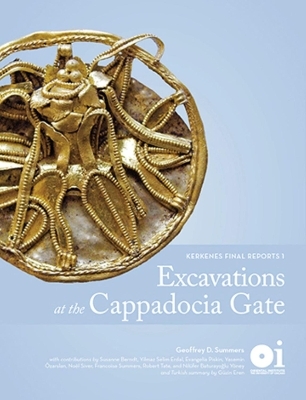
Excavations at the Cappadocia Gate
Kerkenes Final Reports 1
Seiten
2021
Institute for the Study of Ancient Cultures (Verlag)
978-1-61491-059-6 (ISBN)
Institute for the Study of Ancient Cultures (Verlag)
978-1-61491-059-6 (ISBN)
- Titel z.Zt. nicht lieferbar
- Versandkostenfrei innerhalb Deutschlands
- Auch auf Rechnung
- Verfügbarkeit in der Filiale vor Ort prüfen
- Artikel merken
The city on the Kerkenes Dag in the high plateau of central Turkey was a new Iron Age capital, very probably Pteria. Founded in the later 7th century BC, it was burned in the mid sixth century and then abandoned. Between 1999 and 2011 one of the seven city gates was excavated in its entirety and these are the results of those excavations.
The city on the Kerkenes Dag in the high plateau of central Turkey was a new Iron Age capital, very probably Pteria. Founded in the later seventh century BC, the city was put to the torch in the mid sixth century and then abandoned. Between 1999 and 2011 what we have called the Cappadocia Gate, one of the seven city gates that pierce the 7 km of strong stone defenses, was excavated in its entirety. This volume documents as fully as possible the results of those excavations, and includes a seven-page summary in Turkish.
The location of the gate and its architecture are discussed and illustrated, with a chapter devoted to its partial restoration. Cultic installations within the gate structure include a built stepped monument with semi-iconic idol, an aniconic stela, and graffiti representing similar stones. Sculpture set up at the back of the gate comprised many fragments of a life-sized statue supported by a plinth bearing adorsed sphinxes carved in relief. The remains of two human victims of the destruction are examined, as are animal bones that perhaps provide evidence of meals consumed by builders of the gate. A final chapter attempts to place these remarkable discoveries in a wider context. The gate plan and the cultic installations and sculpture set up inside the gate appear to be entirely Phrygian. Combined with evidence of Paleo-Phrygian inscription and graffiti already published (OIP 135), this volume sheds dramatic new and unexpected evidence for the power, wealth, and sophistication of an eastward expansion of Phrygia. The brief existence, hardly more than 100 years, together with the excellent stratigraphic context of the destruction level, provide an unparalleled window onto the first half of the sixth century BC on the Anatolian Plateau.
The city on the Kerkenes Dag in the high plateau of central Turkey was a new Iron Age capital, very probably Pteria. Founded in the later seventh century BC, the city was put to the torch in the mid sixth century and then abandoned. Between 1999 and 2011 what we have called the Cappadocia Gate, one of the seven city gates that pierce the 7 km of strong stone defenses, was excavated in its entirety. This volume documents as fully as possible the results of those excavations, and includes a seven-page summary in Turkish.
The location of the gate and its architecture are discussed and illustrated, with a chapter devoted to its partial restoration. Cultic installations within the gate structure include a built stepped monument with semi-iconic idol, an aniconic stela, and graffiti representing similar stones. Sculpture set up at the back of the gate comprised many fragments of a life-sized statue supported by a plinth bearing adorsed sphinxes carved in relief. The remains of two human victims of the destruction are examined, as are animal bones that perhaps provide evidence of meals consumed by builders of the gate. A final chapter attempts to place these remarkable discoveries in a wider context. The gate plan and the cultic installations and sculpture set up inside the gate appear to be entirely Phrygian. Combined with evidence of Paleo-Phrygian inscription and graffiti already published (OIP 135), this volume sheds dramatic new and unexpected evidence for the power, wealth, and sophistication of an eastward expansion of Phrygia. The brief existence, hardly more than 100 years, together with the excellent stratigraphic context of the destruction level, provide an unparalleled window onto the first half of the sixth century BC on the Anatolian Plateau.
Geoffrey D Summers, jointly with his wife Françoise, inaugurated research at Kerkenes that they were to continue for twenty years.
| Erscheinungsdatum | 23.03.2021 |
|---|---|
| Reihe/Serie | Oriental Institute Publications |
| Zusatzinfo | 3 figs, 185 pls & 12 tbls. |
| Sprache | englisch |
| Maße | 229 x 297 mm |
| Gewicht | 2138 g |
| Themenwelt | Geisteswissenschaften ► Archäologie |
| Geschichte ► Allgemeine Geschichte ► Vor- und Frühgeschichte | |
| Geisteswissenschaften ► Geschichte ► Regional- / Ländergeschichte | |
| ISBN-10 | 1-61491-059-6 / 1614910596 |
| ISBN-13 | 978-1-61491-059-6 / 9781614910596 |
| Zustand | Neuware |
| Haben Sie eine Frage zum Produkt? |
Mehr entdecken
aus dem Bereich
aus dem Bereich
auf den Spuren der frühen Zivilisationen
Buch | Hardcover (2023)
C.H.Beck (Verlag)
20,00 €
Konzepte – Methoden – Theorien
Buch | Softcover (2024)
UTB (Verlag)
39,90 €
Was Pompeji über uns erzählt
Buch | Hardcover (2023)
Propyläen (Verlag)
32,00 €


